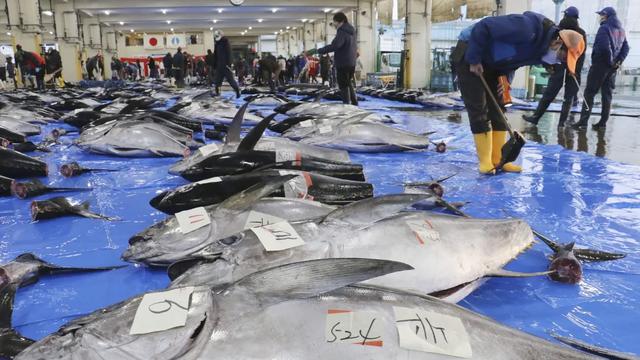为什么有些人受不了海鲜(要跟海鲜说再见了吗)

在13日上午召开的相关阁僚会议上,日本首相菅义伟表示他的政府决定将福岛第一核电站核污水排入大海。
日本方面表示,将福岛核污水排入海中的计划大约会在两年内启动,整个过程可能将持续十年。
此前一天,菅义伟称福岛核电站不断增加的核污水问题不能再拖下去了。他表示,将从科学角度说明排放方案,以便国内外对安全性问题达成理解。
Japanese Prime Minister Yoshihide Suga said on Tuesday that his government has decided to discharge contaminated radioactive wastewater in Fukushima Prefecture into the sea amid domestic and international opposition.
Suga made the announcement after convening a meeting of relevant ministers to formalize plans to release the radioactive water accumulated at the plant into the Pacific Ocean.
The plant's operator Tokyo Electric Power Company Holdings Inc. said it will take around two years for the release to start.
真的安全吗?
日本官方一直在努力论证核废水排放的安全性。
福岛第一核电站运营商东京电力公司表示,绝大部分放射性物质经精密的过滤程序后都可以清除,在核废水入海前,还会进行二次处理,把废水里氚的浓度稀释到日本国家标准的四十分之一。
但去年发表在《科学》杂志上的一项研究显示,经过处理的福岛核废水中残留的放射性同位素包括碳14、钴60和锶90,这些都是可能致癌的放射性核素,这类同位素很容易被海底沉积物和鱼类等海洋生物吸收。
中国地质大学海洋研究所教授刘恩涛表示,放射性物质可以在海洋生物体内积累、携带和扩散,然后通过食物链传递给人类。
According to a study published in the journal Science last August, radioactive isotopes that remain in the treated water in the tanks in Fukushima include carbon-14, cobalt-60 and strontium-90, a radionuclide that can cause cancer.
These and the other isotopes that remain in the water all take a very long time to decay. For example, carbon-14 has a half-life (the time required for a radioactive substance to lose 50 percent of its radioactivity by decay) of 5,370 years.
Such isotopes can be absorbed easily by seafloor sediments and marine life like fish, according to the study.
In that way, radioactive materials can accumulate in the body of marine life, which carry and spread them around. Then through food chain, radioactive materials can be passed on to human, according to Liu Entao, a professor at the Institute of Oceanology, China University of Geosciences.
Experiments have shown that long-time and large-quantity consumption of radiation-contaminated seafood may result in the excessive accumulation of radioactive substance in the human body, causing damage to one's hematopoietic organs, endocrine system and nervous system, according to a paper by China's National Marine Environment Monitoring Center.
Ken Buesseler, author of the paper in Science and a marine chemist at the Woods Hole Oceanographic Institution, wrote that "any option that involves ocean releases would need independent groups keeping track of all of the potential contaminants in seawater, the seafloor, and marine life."
"The health of the ocean and the livelihoods of countless people rely on this being done right," he added.

Tuna lined up for the year's first auction at a market in Nachikatsuura in Wakayama Prefecture, western Japan, January 4, 2021. /CFP
这些带有放射性物质的核废水将随着洋流在10年里扩散到全世界。
尽管有观点认为海洋具有强大的自净能力,可以自行完成生态恢复,但刘恩涛教授依旧认为,如此大量的核污水排放肯定会对海洋环境产生相当大的负面影响。
Despite an argument that the ocean has self-purification ability and could restore its ecological environment by itself, Liu said the discharge of such large quantity of contaminated water will definitely have considerable negative impact on the maritime environment.
This view was echoed by Zhu Jianzhen, former vice president of Guangdong Ocean University.
"Unless we see this issue in the span of thousands of years, the adverse effects of the disposal in the ocean will not disappear in a short period of time or even a few hundred years," Zhu told the Global Times.
美国:“可接受的”
很长一段时间以来,日本政府欲向海洋排放核废水的意图一直遭到日本渔业行业和公众的强烈反对,因为排放核废水可能对人民健康和渔业生产带来负面影响,周边国家也表示了关切和担忧。
日本政府的这个决定无视了海内外的反对声音,一经公布,国际舆论哗然,中、韩两国都公开谴责了日本不负责任的做法。
可是居然有人表示支持。

Screenshot via Twitter
在日本政府正式宣布上述决定之后,美国务院在官网发布声明称,“日本政府与国际原子能机构(IAEA)密切合作,已采取措施对2011年3月福岛第一核电站核事故的后果进行处理。日本政府已宣布关于ALPS(多核素去除设备)处理水的基本政策的决定,将处理后的核污水排入大海。”
声明称,“美国意识到,日本政府研究了与福岛第一核电站现场储存的处理水管理相关的几种方案。面对这一独特和具有挑战性的局势,日本权衡了各种选择和影响,对其决定保持透明,似乎采取了一种符合全球公认的核安全标准的办法。”
"We look forward to the Japan's continued coordination and communication as it monitors the effectiveness of this approach," said the U.S. State Department in a statement on Tuesday.
In the statement, the department stressed Japan has weighed the options and effects and has been transparent about its decision. The government "appears" to have adopted an approach in accordance with globally accepted nuclear safety standards, it added.
有网友发现,美国食品药品管理局近日发布的一份进口警告里明确禁止包括鱼、肉禽、蛤蜊在内的多种日本食品进入美国。
事实上,这份警告早在福岛核泄漏发生后就已经发出,到今天已经修订了十余次。与此前的版本相比,这份最新的版本其实是放宽了对日本的进口限制——解禁了三种食品——但大量的日本食品依旧被挡在美国的国门之外。

至于中国,中国至今仍禁止福岛县、群马县、栃木县、茨城县、宫城县、新泻县、长野县、琦玉县、东京都、千叶县等日本12个都县的食品、食用农产品及饲料进口。
只是一旦核废水排放入海这个“潘多拉魔盒”被打开,一切会走向何方没有人知道。
,免责声明:本文仅代表文章作者的个人观点,与本站无关。其原创性、真实性以及文中陈述文字和内容未经本站证实,对本文以及其中全部或者部分内容文字的真实性、完整性和原创性本站不作任何保证或承诺,请读者仅作参考,并自行核实相关内容。文章投诉邮箱:anhduc.ph@yahoo.com






